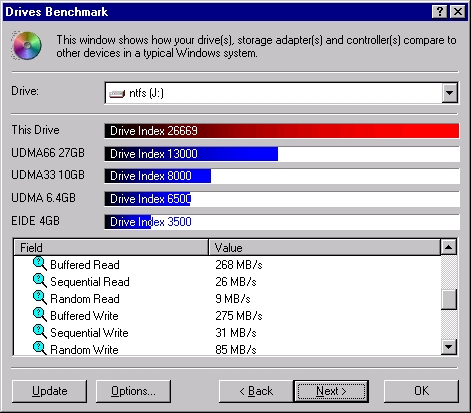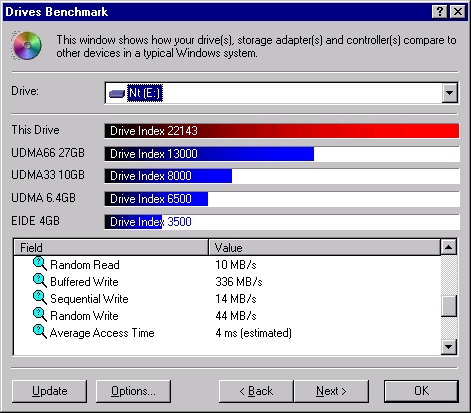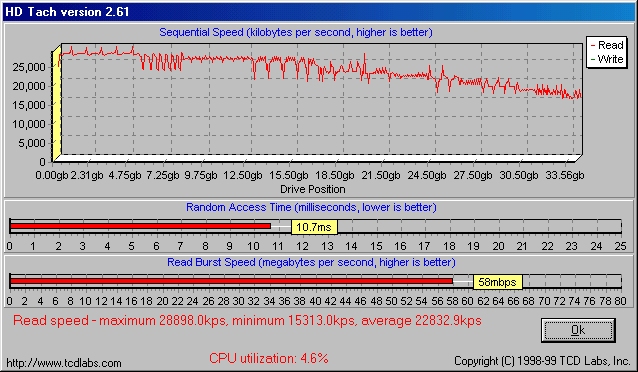Bonnie Benchmarks
|
100mb test
file
|
|
|
|
500mb test file
|
|
|
|
|
|
|
|
|
|
Writes:
|
Per Char
|
7184
|
|
Writes:
|
Per Char
|
7026
|
|
Block
|
44236
|
|
|
Block
|
34156
|
|
Re-Write
|
29075
|
|
|
Re-Write
|
12645
|
|
Reads:
|
|
|
|
Reads:
|
|
|
|
Per Char
|
7487
|
|
|
Per Char
|
7290
|
|
Block
|
178471
|
|
|
Block
|
28377
|
|
Random
Seeks:
|
|
18032
|
|
Random Seeks:
|
255
|
To test the raw throughput of the drive, I downloaded
and newely released RedHat Linux 6.2 ISO which weighs in at a hefty 650mb.
Performing partition to partition moving of the image took an average of 53
seconds. Do that math and you see that the throughput was only in the 12.5mb/sec
range, not very impressive when looking at the synthetic benchmarks. But remember
that in actuality the drive was both reading and writing at 12.5mb/sec, which
fits very closly with the other benchmarks.
After I finished benchmarking the drive under
Linux, I again tried to get NT to format the drive with no luck. A quick check
on Quantums web site netted me the the telephone support phone number, I was
quite happy to see that there was no little note "a $20 service charge is
applied to each case". After wandering through several automated voice menu
systems, I found myself on hold for only about 2 min before I was speaking
with a support technician. I described my system setup and the problems I
was having, we went through several routine checks just to make sure I hadn't
gotten up to early that morning and forgot to plug the darn thing in. The
drive checked out fine, and it was concluded that there was something screwey
with the partition table that nether a low-level format nor fdisk could fix.
The solution was a 60 second session in the old DOS utility Debug, which we
used to systematically erased every single byte on the drive. A quick fdisk
once this was finished and I was into benchmarking the drive. Both NT, Win98,
and DOS were now able to format the drive at will, and my Windows benchmarking
commensed.
NFTS
First up under NT was SiSoft Sandra 2000 Pro.
Sandra interfaces with the drive via the file system (which is why we see
some large differences in the Win98 and NT benchmarks) and streams data from
system RAM to ensure that all bottlenecks encountered are those of the drive
and the are not higher up in the I/O subsystem.

|
NTFS
|
|
|
Buffered
Read
|
395MB/sec
|
|
Sequential
Read
|
27MB/sec
|
|
Random Read
|
10MB/sec
|
|
Buffered
Write
|
249MB/sec
|
|
Sequential
Write
|
15MB/sec
|
|
Random Write
|
33MB/sec
|
|
Average
Access Time
|
4ms
|
What can I say, this drive is smokin fast. It
should be noted that during my benchmarking, everyonce in a while, I got extremely
high benchmarks that I'm very suspect of. Notice the Random Write benchmark
of 85mb/sec, this would seem to be a hugely exagurated figure, as correct
number is more around 45mb/sec, although I could not pin down the source of
the wild numbers I suspect that Sandra uses a benchmark file which is around
250MB, and sometimes NT was able to free enough RAM to cache the file, although
that's just speculation. Under NTFS the drive shows it's muscle in the sequential
read and write tests, both times right up with the Quantums specs.
FAT

|
FAT16
|
|
|
Buffered
Read
|
366MB/sec
|
|
Sequential
Read
|
27MB/sec
|
|
Random Read
|
10MB/sec
|
|
Buffered
Write
|
250MB/sec
|
|
Sequential
Write
|
13MB/sec
|
|
Random Write
|
19MB/sec
|
|
Average
Access Time
|
4ms
|
Here we see that the drive also screams under
a FAT file system. Interestingly enough, the drive did not exhibit the same
wild benchmarking behavior as was seen under NTFS. It is quite evident how
much of a performance difference the large cache makes when you look at the
buffered read and write numbers, those just arn't comparable to drives with
2MB and less of cache.

Running HD Tach under Windows 98, the drive shows
some performance on the outer tracks of the drive, with sequential reads peaking
around 30MB/sec. Near the very inner tracks of the drive, performance takes
a signifant hit with reads peaking at only around 15MB/sec. This is not really
unexpected though, all drives have a similar read performance pattern simply
because of the slower platter to head speed ratio near the inner tracks of
the drive compared the outer tracks. The seek time's that HD Tach reported
seem quite high, but this may be a factor of the FAT file system. The burst
speeds reported are also substantially lower than reported in the other benchmarks,
it seems almost as if it's reporting sequential read preformance, rest assured
I did run the benchmark quite a few times, and the numbers were quite consistant.
The CPU utalization is nice and low where we would expect it to be when using
a SCSI based drive. Even during my streaming tests the CPU usage was quite
low, hovering around the ~6% mark when under a full load.
|
FAT32
|
|
|
Buffered Read
|
107MB/sec
|
|
Sequential
Read
|
28MB/sec
|
|
Random Read
|
9MB/sec
|
|
Buffered Write
|
94MB/sec
|
|
Sequential
Write
|
15MB/sec
|
|
Random Write
|
13MB/sec
|
|
Average Access
Time
|
4.3ms
|
Heat
One thing that you should be very aware of when
running SCSI drives is heat. SCSI drives historically have run quite hot,
and I expected that would probally need to use a drive cooler for benchmarking.
However when I inquired, Quantum assured me that I wouldn't need any sort
of cooling on the Atlas, that it is easily able to dissapate the heat it produces
through the metal housing. I was interested to see just how accurate that
statement was, as you can easily cook your supper on top of an older, uncooled
Seagate Cheetah drive. During normal system use, Word Processing, MP3 listning,
Net surfing, and The GIMP open in the background, the drive was barely warm
to the touch, only 5C above case temperature (22C). When under a heavy load
of benchmarking with Bonnie serving up MP3's at the same time it's a different
story. The drive was much warmer during this marathon, hovering around the
34C mark (94F) which is definitly warm in my books considering my IDE drives
run in the 25C range. I was surprised at how large of a difference there was
in temperature when idle and under load, but even 35C doesn't hold a match
to the nuclear rod temperatures of the Cheetah drives. So if your only going
to be running a single Atlas V in a system and have decent system cooling,
then a cooler is definitly not a requirement as long as you take into account
the heat produced by the drive. However if your going to be running a dual
or quad setup in a server, make absoutly sure you have an adequate cooling
system as the heat produced by 4 drives under a constant load is nothing to
scoff at.
Noise
When 7200RPM SCSI drives first appeared, and
later IDE variants, they generally ran very loud, and many users found them
very annoying. The Atlas V incorporates their Quantum's new "Quiet Drive"
technology. When I first booted up the test-bed with the Atlas installed and
the side off, I had to double check that indeed the drive was running. Boot-up
is the loudest that the drive ever is, during it's 3 second spin-up and self
POST, but once passed this stage the drive is amazingly quiet. The most noticable
thing is that it doesn't "grind" during heavy use as IDE drives commonly do,
the drive sounds almost as if it's muffled. If you sit fairly close to your
system when your using it, you'll definitly notice that the Atlas runs nice
and quiet.
Power Concerns
One problem that may arise when the Atlas V is
used in multiple drive configurations is power draw. The drive is rated at
a peak power-up current draw of 2.2A on the +12 line. Alone, this is not a
large draw, but when used in multiple disk configurations, the power requirements
get fairly hefty and a 300watt or higher power supply should definitly be
a requirement. Considering that your average 300 watt power supply kicks out
15Amps on the +12v line, even when running a dual disk setup, during power-up
the drives will be sucking about 37% of the total available power, and power-up
is when most devices draw the most power, so if your running a smaller power
supply power draw should be a concern.
Conclusion
Despite the installation woe's I experienced,
I believe this to be an isolated case, and not refelective of all drives.
The specs the drive sports are very impressive, as equally are the benchmarks.
The 4mb buffer and 7200 RPM spindle speed definitly shine through in the sequential
read tests, the buffered reads are nothing short of spectatcular and lend
the drive to being well suited for server situations. The Atlas V's performance
with smaller sized files (under available system RAM size) where the 4mb of
onboard cache and the system file caching are able to work in unison is simply
astounding, and lends itself especially well toward server situations. Even
when the file size was cranked up the benchmarks were still fairly good across
the board, with numbers being pretty consistant. For an average user, the
Atlas V's performance would very rarely be realized, and the investment for
the drive and a SCSI controller would not make it very attractive. For power
users and gamers who crave speed, the Atlas V certinally helps with map load
times and should be considered, although the investment may deter a lot of
users who do not already have a SCSI based system. But servers are the Atlas's
stong point. Where most large SCSI hard drives of this size are in relativly
the same price range, and performance is the backbone of a network is where
the Atlas V shines. Power draw and heat production should be kept in mindwhen
purchasing the Atlas V, although I would expect Power users and servers to
already have adequate power and cooling systems, and these would not really
be of concern.
Overall the Atlas V gets a 9½ for performance,
bottom line is it's fast, very fast. I deducted ½ for combined power concerns
and heat production, and another ½ for the installation problems I had. Leaving
the Atlas V with a solid 8½ rating and skirting dangersouly close to receiving
the coveted Editors Choice award, but the installation problems were the deciding
factor. Although Tech Support was very good, I can't imagine a user new to
SCSI having to first trouble shoot a problem like this, and then end up mucking
around in MS Debug. © 2000 
Andrew Oliver
00/04/29